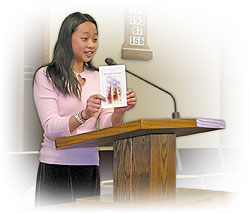An article in the blog “LDS Anarchy” proposes the concept of “congregational nullification.” It is based on the concept of “jury nullification”: or making a law void by jury decision. In congregational nullification, a church action is rendered void by ignoring it. “Simply ignoring all instructions deemed to be unjust, unwise, overbearing, tyrannical or humiliating nullifies the instructions. End of story.”
This process has gone on in the Mormon church on several issues. I will mention one here: coffee and tea. While the church opposes their consumption, there appears to be little health justification for the prohibition. Many good Mormons consume coffee and tea, including many of my relatives. Yet they continue to receive temple recommends and serve high church positions. Somewhere in the lower reaches of the church there is some serious congregation nullification going on. Some members have clearly passed a verdict against this part of the Word of Wisdon by ignoring it.
“LDS Anarchy” suggests two examples of where congregational nullification might be applied: (1) the First Presidency’s letter (and actions) on the California marriage bill and (2) the recent prohibition against using visual aids while speaking in church. “LDS Anarchy’s” suggestion is to ignore the counsel of our leaders as it relates to both issues. The latter is not a big issue with me; however, the former is. We must do more than just ignore the letter.

Image from page on http://www.LDS.org - Whoops, better put that visual aid down.
Robert Rees in a presentation at the 2008 SLC Sunstone Symposium, suggested that the Mormon church’s ban on crosses and crucifixes may not have a strong basis in Mormon history. He indicated that he is personally inspired by the symbol of the cross and would like to see it have a more prominent spot in Mormon religiousity. Rees suggests that the discrete wearing of a cross might be one avenue that could be explored. His audience responded positively to his message.
If someone is predisposed to take even more affirmative action, there is the option of voting with your pocketbook. While filling our your tithing form, you could allocate more money to “Humanitarian Service,” “Fast Offerings,” and “Perpetual Education Fund” and less to discretionary accounts, depending on where your interests are. This, of course, could put your temple recommend at risk.




L. Jackson Newell relates the following Q&A in an autobiographical piece in Dialogue (Winter 2006, p. 176). It was part of an interview for a position in the Bishopric:
Q: Are you a regular tithe-payer?
A: Yes, we tithe but the money does not all go to the Church.
In a SL Trib column on July 11, 2009, Robert Kirby writes:
“I’m okay with paying tithing. In fact, I think a major part of a provident life is sharing what you have with those less fortunate. Some pay it to a church in the form of a tithe, but it’s also charitable contributions of any kind.”
According to Ed Firmage Jr. writing in the SLTrib (5 Feb 2010):
“What Grandfather (Hugh B. Brown) helped me understand, and what Christianity, Inc. has forgotten, is that the struggle is all.
“To be a good Christian,” as Harold Bloom rephrases Kierkegaard, “is to be in opposition to the established order.”
By extension, I reason, to be a good Mormon is to be in opposition to Mormonism. “Away with stereotyped Mormons,” said Brigh Young. So, I try to be the best untypical Mormon I can, to honor my great-grandfather Hugh and my great-great-great-grandfather Brigham.”